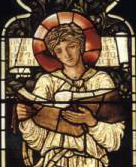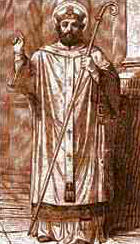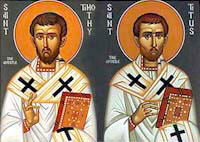Ordinary Time: January 26th
Memorial of Sts. Timothy and Titus, bishops
Today the Church celebrates the memorial of Sts. Timothy and Titus, bishops, both faithful companions of St. Paul on his missionary journeys. Before the reform of the Roman Calendar in 1969, St. Timothy's feast was celebrated on January 24 and St. Titus' on February 6. This date was formerly the feast of St. Polycarp, now moved to February 23.
St. Timothy Timothy was Paul's dearest disciple, his most steadfast associate. He was converted during the apostle's first missionary journey. When Paul revisited Lystra, Timothy, though still very young (about twenty) joined him as a co-worker and companion. Thereafter, there existed between them a most intimate bond, as between father and son. St. Paul calls him his beloved child, devoted to him "like a son to his father" (Phil. 2:22). Of a kindly disposition, unselfish, prudent, zealous, he was a great consolation to Paul, particularly in the sufferings of his later years. He also assisted the apostle in the establishment of all the major Christian communities and was entrusted with missions of highest importance. Timothy was with Paul during his first Roman imprisonment. Paul made his self-sacrificing companion bishop of Ephesus, but the finest monument left him by his master are the two canonical Epistles bearing his name.
Timothy was Paul's dearest disciple, his most steadfast associate. He was converted during the apostle's first missionary journey. When Paul revisited Lystra, Timothy, though still very young (about twenty) joined him as a co-worker and companion. Thereafter, there existed between them a most intimate bond, as between father and son. St. Paul calls him his beloved child, devoted to him "like a son to his father" (Phil. 2:22). Of a kindly disposition, unselfish, prudent, zealous, he was a great consolation to Paul, particularly in the sufferings of his later years. He also assisted the apostle in the establishment of all the major Christian communities and was entrusted with missions of highest importance. Timothy was with Paul during his first Roman imprisonment. Paul made his self-sacrificing companion bishop of Ephesus, but the finest monument left him by his master are the two canonical Epistles bearing his name.
— Excerpted from The Church's Year of Grace, Pius Parsch
St. Titus St. Titus, a pagan by birth, became one of St. Paul's most illustrious disciples. He accompanied the apostle on several of his missionary journeys and was entrusted with important missions. Finally he came with St. Paul to the island of Crete, where he was appointed bishop. He performed this duty in accordance with the admonition given him, ". . . in all things show yourself an example of good works" (Tit. 2:7).
St. Titus, a pagan by birth, became one of St. Paul's most illustrious disciples. He accompanied the apostle on several of his missionary journeys and was entrusted with important missions. Finally he came with St. Paul to the island of Crete, where he was appointed bishop. He performed this duty in accordance with the admonition given him, ". . . in all things show yourself an example of good works" (Tit. 2:7).
Tradition tells us that he died a natural death at the age of 94, having lived in the state of virginity during his whole life. St. Paul left a worthy monument to Titus, his faithful disciple, in the beautiful pastoral letter which forms part of the New Testament. Today's feast in his honor was introduced in 1854.
— Excerpted from The Church's Year of Grace, Pius Parsch

No comments:
Post a Comment